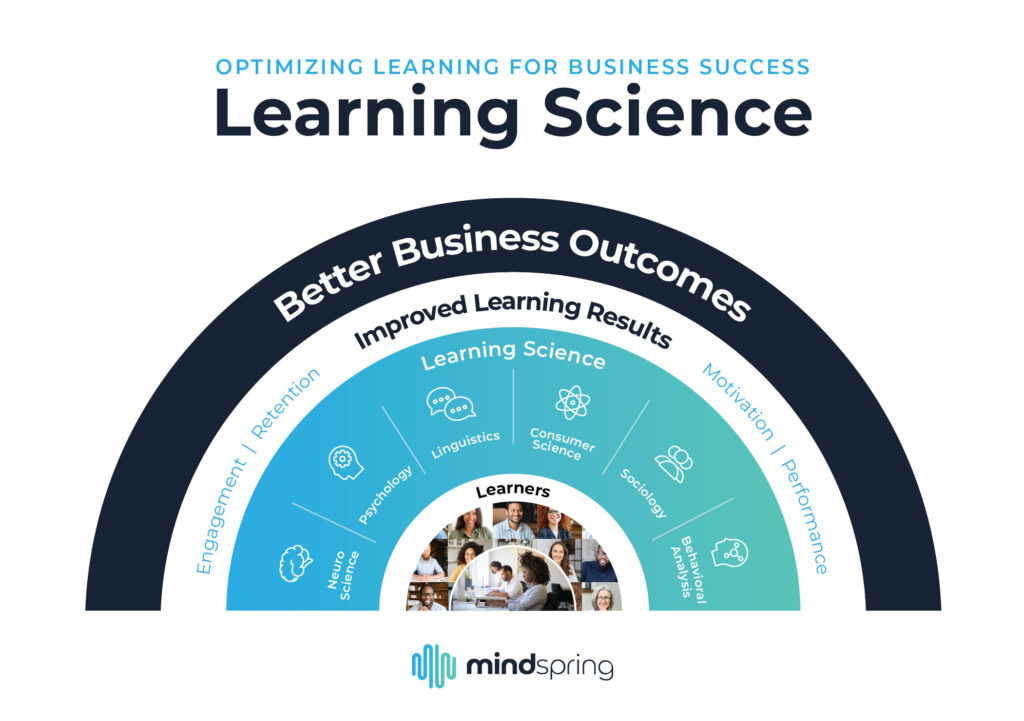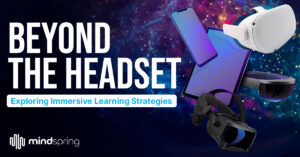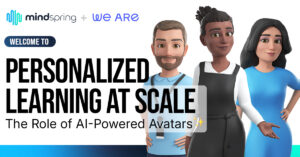
In the dynamic world of organizational growth and development, harnessing the full potential of employees is a critical factor for success. Learning science, an interdisciplinary field that includes neuroscience, psychology, linguistics, consumer science, sociology, and behavioral analytics, is revolutionizing how we understand and implement corporate learning and development (L&D). This diverse blend of disciplines collectively contributes to enhancing key aspects of learning – engagement, retention, motivation, and performance – each significantly contributing to improved business results.

Interdisciplinary Approach to Engagement
Engagement in learning is a complex phenomenon influenced by various factors including emotional, cognitive, and social elements. The multifaceted insights from learning science offer a comprehensive understanding of these elements. For instance, neuroscience provides a window into how the brain engages with and processes new information, while sociology helps identify the social contexts that influence engagement. This integrated approach ensures that learning experiences are not only intellectually stimulating but also emotionally and socially resonant, leading to higher levels of engagement among employees.
Enhanced Retention through Learning Science
By harnessing the principles and techniques derived from learning science, significant improvements can be made to the retention of learning material. One key aspect of learning science is recognizing the importance of active engagement and meaningful learning experiences. Learners are more likely to retain the material when they actively participate in the learning process through hands-on activities, discussions, or problem-solving exercises. Active learning enhances comprehension and encourages deeper processing and encoding of information in long-term memory.
Each discipline within learning science contributes to improved retention of material. Psychology aids in understanding how memory works, linguistics helps to effectively communicate content for better comprehension, and behavioral analytics offers insights into patterns of learning and retention. When these insights are combined, they create a framework for designing learning programs that significantly improve the retention of information, ensuring that employees can effectively recall and apply what they have learned.
Boosting Motivation with a Scientific Foundation
Learning science plays a pivotal role in boosting learners’ motivation by addressing the psychological and cognitive aspects that influence their engagement and persistence in the learning process.
One way in which learning science contributes to motivation is through the concept of self-determination theory. This theory suggests that individuals are more motivated when they perceive autonomy, competence, and relatedness in their learning experiences. By designing educational settings that allow learners to make choices, develop their skills, and feel a sense of belonging, educators can foster intrinsic motivation, where individuals are driven by their genuine interest and curiosity.
Moreover, learning science recognizes the importance of setting clear, achievable goals and providing timely feedback. Goal-setting theory asserts that learners are more motivated when they have specific, challenging goals and receive feedback on their progress. Learning experiences incorporating goal-setting and feedback mechanisms can enhance learners’ sense of achievement and competence, ultimately boosting their motivation to continue learning.
Additionally, understanding the role of emotions and metacognition in learning science allows educators to create a positive and supportive learning environment where learners feel confident in managing their emotions and regulating their own learning processes. This, in turn, contributes to increased motivation as learners gain a greater sense of control and self-efficacy over their learning journey.
In summary, learning science provides valuable insights into the factors that drive learner motivation, enabling educators to design more effective and engaging educational experiences that inspire and sustain learners’ enthusiasm for acquiring knowledge and skills.
Improving Performance through Integrated Learning Strategies
Learning programs that integrate insights from neuroscience, psychology, and various disciplines stand to improve employee performance significantly through learning and development. When employees actively engage in training, their cognitive processes are optimized for better information processing and encoding. This leads to not just the accumulation of knowledge but also the development of essential skills and competencies that are vital for their roles within the organization.
Applying knowledge to practical, work-related tasks is crucial in corporate training. Learning science recognizes that the true measure of success is not just what employees know but how effectively they can apply that knowledge in their daily job responsibilities.
Training programs become more relevant and meaningful by aligning learning objectives with practical workplace challenges and scenarios. This, in turn, bolsters employees’ confidence and competence, ultimately resulting in improved job performance. Furthermore, the question of “What do learners need to know, do, and believe?” is the essence of effective corporate training based on learning science. It underscores the importance of imparting knowledge and skills and shaping employees’ attitudes, values, and beliefs to align with the organization’s culture and goals. In this way, learning science-driven training programs lay the foundation for well-rounded, high-performing employees who can contribute effectively to their organizations.
Collective Impact on Business Results
The collective impact of engagement, retention, motivation, and performance, as enhanced by learning science, leads to measurable business benefits. Engaged and motivated employees are more likely to be committed and loyal to the organization, reducing turnover rates. Better retention of learning material means a more competent workforce, ready to tackle complex tasks and challenges. Enhanced performance directly correlates with increased productivity and efficiency, driving business growth and success.
In summary, the application of learning science in Learning & Development is a strategic approach that benefits all aspects of employee development. By embracing the comprehensive insights offered by neuroscience, psychology, linguistics, consumer science, sociology, and behavioral analytics, organizations can create learning environments that not only foster skill development but also cultivate innovation and creativity. The result is a workforce that is well-equipped, motivated, and aligned with the organization’s goals, driving substantial improvements in business outcomes.
As a leader in the field, MindSpring embodies a unique blend of expertise across the six key disciplines of Learning Science: neuroscience, psychology, linguistics, consumer science, sociology, and behavioral analytics. This multidisciplinary approach enables us to design and deliver learning solutions that are not only scientifically sound but also highly effective and tailored to meet the specific needs of each organization. Our team of experts leverages cutting-edge research and practical insights to create training programs that maximize engagement, retention, motivation, and performance. This partnership is pivotal for businesses seeking to unlock the full potential of their workforce and drive significant improvements in their overall performance and business results.


